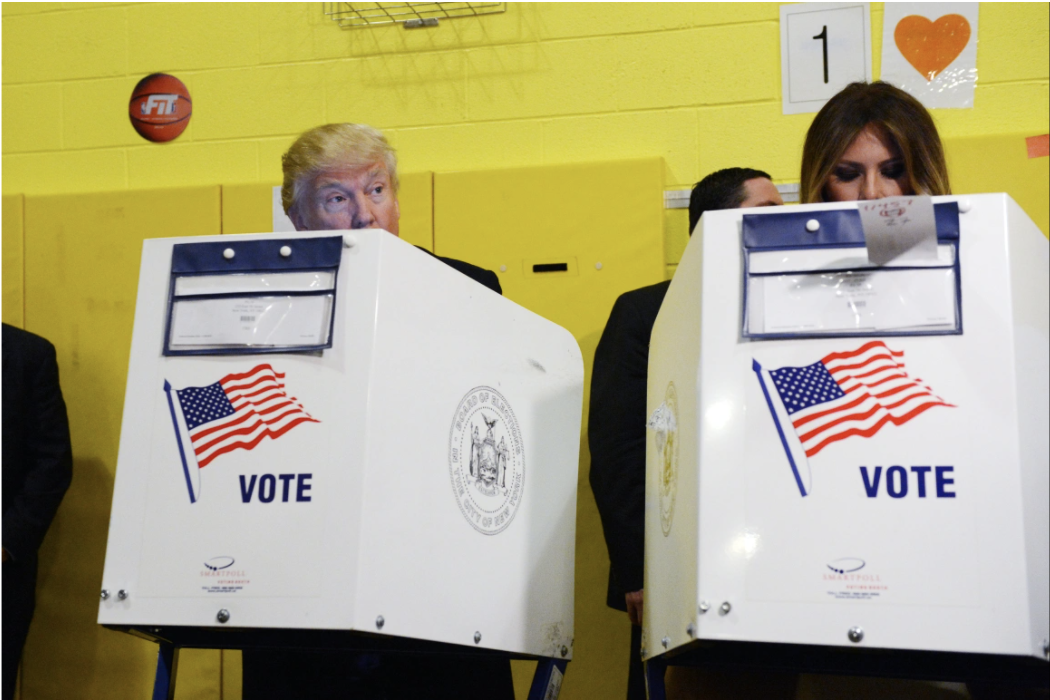After widespread claims of voter fraud in the 2020 election, recent news reveals that former President Donald J. Trump was directly involved in the development of plans to seize control of voting machines during the election. Trump, alongside advisors, employed the Department of Homeland Security and the Defense Department in investigating rumors of voter fraud. Furthermore, the Jan. 6 panel obtained a draft executive order issued by Trump before the election that would have made the defense secretary take control of voting machines.
If Trump had been successful in seizing these voting machines, it would have been an expansion of executive powers into uncharted territories. Never before has a president interfered so directly with an election. Such an action would have been one of the clearest examples of executive aggrandizement thus far in American history, and is demonstrative of a threat to American democracy at large.
While one might think that democracies are only threatened by coups, political scientist Nancy Bermeo discusses in her article, titled “On Democratic Backsliding” that the process of democratic erosion since the Cold War is more frequently caused by executive aggrandizement. Executive aggrandizement occurs when leaders “weaken checks on executive power” [1]. Bermeo further argues that strategic election manipulation is another form of democratic backsliding [2]. Trump engaged in strategic election manipulation by attempting to use incumbent resources to prevent his opponent Joe Biden from winning the election.
Given this revelation, questions arise about how to preserve fundamental democratic norms and institutions in the United States. What elements of the American democracy prevented this attack on the sanctity of elections? How can democratic norms be protected in the future?
In the 2020 election, American democracy was upheld by institutional norms and the interests of politicians. Voters, on the other hand, did not uphold democratic principles due to strong partisan ties.
Even though Trump attempted to involve the Department of Homeland Security to tamper with voting machines, many officials refused. For example, the department’s acting deputy secretary said he “lacked the authority to audit or impound the machines.” Despite Trump’s misgivings, officials in the Departments of Justice and Defense even claimed that the 2020 election “was the most secure in American history.” These departments were not willing to break the past norms of interfering with the election, especially since they believed the claims of voter fraud were baseless and unverifiable. The Department of Homeland Security and the Department of Defense served as a check against Trump and attempted to restore democratic values.
American politics is built on a set of norms. Steven Levitsky and Daniel Ziblatt make the argument in their book, How Democracies Die, that executive powers have to respect norms to have a functioning democracy [3]. Had other actors not respected both the law and long-standing norms, the election in 2020 could have had a very different outcome. Without norms, there would be no checks or accountability.
While some of Trump’s inner-circle initially supported these measures, the involvement of the military and other departments acted as a check to dissuade the administration from following through on this plan. When the use of the military came into question, members of Trump’s inner circle, like his lawyer Mr. Giuliani, realized the larger implications of the plan and the potential damage to democracy. In addition, undertaking such a plan would have jeopardized the careers or political ambitions of those involved.
While some may believe that voters would have been the best check against the potential tampering of voting machines, voters, in reality, seem to prioritize their partisan beliefs. Even after the events of January 6th, a Pew Research Center survey found that two-thirds of Republicans would like to see Trump continue to be a prominent political figure and 44% would like him to run in the 2024 presidential election. This statistic demonstrates that voters will typically align with their party identification, even in the face of a total disregard for democratic norms. Scholars Matthew Graham and Milan Svolik argue in their article that voters are willing to trade off democratic principles for partisan loyalty [4]. Their theory could explain why a significant number of Republican voters still would vote for Trump, despite his clear attacks on democracy.
The fact that voters still see Trump as a viable option for the 2024 election highlights a need to analyze the mechanisms that protected and sustained American democracy. We should not view this recent news regarding attempts to control voting machines as a mere symptom of the Trump presidency, but, rather, a symbol of how powerful and far-reaching presidential power has become over time. Thus, the American public must be ready to act as a check against interference in the electoral sphere.
[1] Bermeo, Nancy. “On Democratic Backsliding.” Journal of Democracy 27, no. 1 (January 2016): 5-19. https://muse.jhu.edu/article/607612, 10. [2] Bermeo, Nancy. “On Democratic Backsliding.” Journal of Democracy 27, no. 1 (January 2016): 5-19. https://muse.jhu.edu/article/607612, 13. [3] Levitsky, Steven, and Daniel Ziblatt. How Democracies Die. New York: Broadway Books, 2019, 101. [4] Graham, Matthew H., and Milan W. Svolik. “Democracy in America? Partisanship, Polarization, and the Robustness of Support for Democracy in the United States.” American Political Science Review 114, no. 2 (2020): 392-409. https://doi.org/10.1017-S0003055420000052, 392.

0 Comments